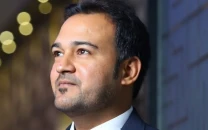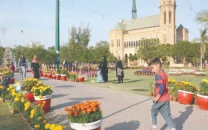Madrassa students: For these beautiful minds, an ugly reality awaits
Schools reject Hafiz-e-Quran students, arguing they emerge from the madrassa too unprepared for mainstream education.

Another young woman was worried about her brother, a Hafiz, who was being refused admission to most private schools offering the Cambridge International O’ Level exam preparation. “Some schools blatantly refused the minute they heard he is a Hafiz-e-Quran. They firmly believe that he cannot cope with the [mainstream] school system,” she says incredulously. “My mother pleaded with them to test and gauge his aptitude and skills at least, but they had made up their minds. We don’t take Hafizs, they told my mother.”
Her mother was forced to question her decision, which she felt had begun to disadvantage her son when it came to the rest of society. Luckily, however, he was accepted by the Fahim’s School System - the only school that allowed him into their Cambridge section.
The irony is that memorising the holy Quran for the love of God can mean that these young boys and girls can be less accepted by many in Pakistani society. Some of them are given the impression that they have not achieved the right levels of ‘development’. “Because according to our social standards, you are behind,” says Ayman grimly. The people judging them don’t stop to think that their minds are sharper, they have more patience, their linguistic skills are fine tuned and they are stronger individuals.
Her madrassa was not one of the “progressive” ones that teach computer studies, math and English. For the longest time, she could only read and speak Arabic and only speak Urdu. Later, however, her mother taught her how to read, speak and write English and Urdu at home. “I read as many books as I could to learn English well as the only school that accepted me then didn’t have the best of teachers,” she recalls.
Ayman sat her O’ Levels and her A’ Levels privately — completely self-taught. As a perfectionist and a hardworking student, she managed. But her brothers struggled. “One of my brothers doesn’t know English or Urdu well,” she says, describing the difficulties he faces now.
While many schools may be biased, the University of Karachi has a quota of seats for Hafiz-e-Quran and their admissions are guaranteed. Some schools even provide them with allowances. “Hamza will start class nine from April when the session starts,” says one mother. She has enlisted the help of a teacher who will start the Matric Board syllabus with him so he can cope with the class. “The school said they have confidence in Hafizs because if they can memorise the holy Quran, their learning power has to be excellent. If they can cope with the process of becoming a Hafiz, they can definitely deal with the school system,” she says proudly.
Hamza is lucky because he is 14 years old — the right age for a ninth grader. But for most Hafizs, the problem is also their age. Many children are refused admission in schools because by the time they emerge from the madrassa, they are too old for the class of their peers. On average, a child can start learning the holy Quran at five years of age. It can take five years to complete but this depends on the child’s ability. In most cases, if the Hafiz is 14 years old, according to the school’s standards, he should be admitted to class seven because of his level of mainstream syllabus knowledge. But as he is too old to be in class seven, he is refused anyway.
The parents of these children naturally want the best for them, as they perceive it. This means that in many cases they want their child to sit the Cambridge International Examinations. Matric sections are usually more flexible. One woman quips that the Matric sections of schools allow Hafizs because the matriculation system is all about memorising and learning notes by heart. “Ratta should be easy for them,” she remarks disparagingly. “But O’ Levels, of course, would be so difficult.”
A solution is needed because many children and their parents who want to undertake that spiritual journey should be celebrated instead of rejected academically and psychologically. They develop inferiority complexes despite the fact that they have achieved no mean feat.
A system of communication or integration between madaris and private schools could perhaps be the answer so that children who want to dedicate a part of their lives to God can later undertake common schooling. They should be able to have the best of both worlds.
Published in The Express Tribune, November 1st, 2010.



















COMMENTS
Comments are moderated and generally will be posted if they are on-topic and not abusive.
For more information, please see our Comments FAQ